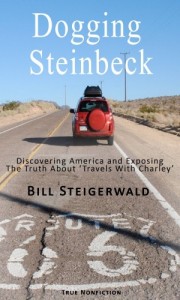I have read travel journals for years, partly to satisfy my wanderlust and partly to see how other folks have done it and what they have found interesting. I recently ran across “Travels with Charley in Search of America” by John Steinbeck and enjoyed reading it very much.
“Travels with Charley” was originally published in 1962 and is a travelogue of Steinbeck’s four month journey across the United States with his standard poodle Charley. Steinbeck undertook the journey because he felt he had lost touch with the American voice. He had spent so much time in Europe and in New York, that he could no longer hear the dialect and dialogues by average people in the small towns of the country.
journey across the United States with his standard poodle Charley. Steinbeck undertook the journey because he felt he had lost touch with the American voice. He had spent so much time in Europe and in New York, that he could no longer hear the dialect and dialogues by average people in the small towns of the country.
The book reflects the United States at a time of turbulence – the decay of the inner city, desegregation, civil rights, the beginning of the Vietnam war. Steinbeck writes about all of this from his personal viewpoint. He writes it as an autobiographical travelogue, but it is important to remember that Steinbeck is a novelist at heart.  A book published in 2011, “Dogging Steinbeck,” by Bill Steigerwald purports to tell the truth about the journey. But whether Steinbeck went the exact places or had the exact conversations is not the important point. Steinbeck admits that he lost every note he ever tried to take on a conversation. Fiction can be more true than nonfiction when it give the sense of a place, a person, or an era.
A book published in 2011, “Dogging Steinbeck,” by Bill Steigerwald purports to tell the truth about the journey. But whether Steinbeck went the exact places or had the exact conversations is not the important point. Steinbeck admits that he lost every note he ever tried to take on a conversation. Fiction can be more true than nonfiction when it give the sense of a place, a person, or an era.
“Travels with Charley” is funny, touching, and true in many ways today. I learned about Steinbeck – for example this quote: “I have always lived violently, drunk hugely, eaten too much or not at all, slept around the clock or missed two nights of sleeping, worked too hard and too long in glory, or slobbed for a time in utter laziness. I’ve lifted, pulled, chopped, climbed, made love with joy and taken my hangovers as a consequence, not as a punishment.” This seems a good summary of Steinbeck’s full and unorthodox life.
I also enjoyed the times when he wrote about Charley, whom he obviously loved a great deal and who was a wonderful traveling companion. Charley’s response to seeing bears in Yellowstone was hilarious. Steinbeck’s care for his dog when Charley was sick shows a side of the man that was often buried.

When Steinbeck writes about watching the “Cheerleaders” in New Orleans, it reminded me that we still have prejudice and hatred rampant in the United States. We have made some progress but it is achingly slow. He asked the question, where were the thoughtful, caring, compassionate people when the cheerleaders were hurling their venom as young black and white children? This is a good question for us, who like to think of ourselves as unprejudiced, to remember. “All that is necessary fro the triumph of evil is that good men to do nothing.” Edmund Burke.
“Travels with Charley” is a fictionalized travelogue that continues to shine truth on our country today. We are not always happy to have these truths revealed. As Steinbeck wrote, “When people are engaged in something they are not proud of, they do not welcome witnesses. In fact, they come to believe the witness causes the trouble.” As Tom and I travel, we will be looking for these truths and listening to the people who speak them.
